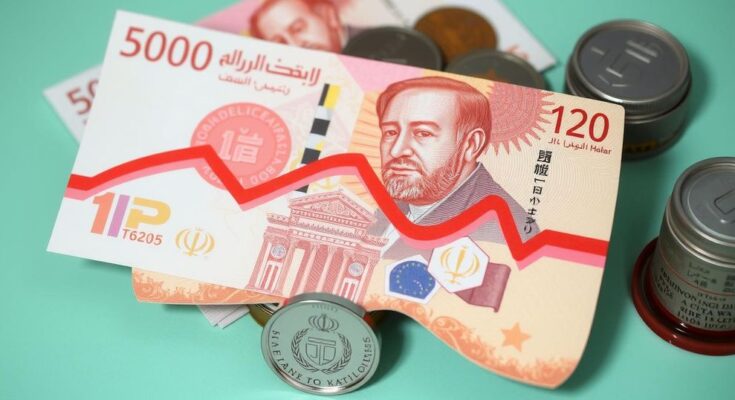Iran is facing serious economic challenges as its currency, the rial, plummets against the US dollar and inflation threatens to exceed 40%. Experts warn that without a swift agreement with the US, economic conditions may deteriorate further, compounded by the geopolitical impacts of regional conflicts and weakened alliances. The situation signals a dire need for changes in both economic policy and international relations.
Iran is experiencing a deepening economic crisis as its currency, the rial, plunges to unprecedented lows against the US dollar. Recently trading at approximately 800,000 rials per dollar and exceeding one million rials per British pound, the rial’s depreciation has been attributed to the “maximum pressure” sanctions imposed by the United States since 2018. Macroeconomist Morteza Afqah has warned that without a timely agreement with Washington, inflation could escalate beyond 40% before the Iranian New Year in March.
The current economic landscape is characterized by rising inflation, coupled with a lack of clarity regarding official inflation figures, which have hovered around 40% since 2019. The cost of essential goods has surged, compounding the financial burdens faced by Iranian citizens. Supreme Leader Ali Khamenei’s chief cleric, Mohammad Mohammadi Golpaygani, acknowledged the extraordinary circumstances due to prolonged sanctions and oil export difficulties, noting, “We are not in a normal situation in the country.”
Compounding the domestic economic challenges, Iran’s geopolitical standing has also suffered. Key allies such as Hamas and Hezbollah have faced significant setbacks, while the recent political turbulence in Syria following the fall of President Bashar al-Assad has undermined Iran’s investments in the region. Macroeconomist Afqah voiced his concerns about the bleak outlook for the Iranian economy, stating, “The short- and even medium-term outlook for our country’s economy is not promising.”
The incoming US administration is expected to maintain or intensify its pressure on Iran, focusing not only on the nuclear program but also seeking to impede Iran’s influence across the Middle East. The convergence of these economic and geopolitical pressures places Iran in a precarious position, leading to widespread uncertainty regarding its economic recovery prospect.
The economic crisis in Iran has been exacerbated by the re-imposition of severe sanctions by the United States, commencing with President Donald Trump’s administration in 2018. These sanctions aimed to reduce Iranian influence in the region and curb its nuclear ambitions. The resultant economic landscape has been marked by plummeting currency values and escalating inflation that has severely impacted the living conditions of ordinary Iranians. Concurrently, Iran’s geopolitical struggles, particularly in the context of its relationships with regional allies, have compounded its economic woes as external pressures mount.
In conclusion, Iran is grappling with unprecedented economic challenges, marked by a rapidly depreciating currency and soaring inflation rates. The outlook for the nation appears grim, as the lack of an agreement with the United States threatens to exacerbate existing economic difficulties. Additionally, geopolitical pressures from weakened allies further complicate Iran’s situation. The combination of these factors underscores the urgency for effective economic management and potential diplomatic engagement to stabilize the nation’s economy.
Original Source: www.iranintl.com




